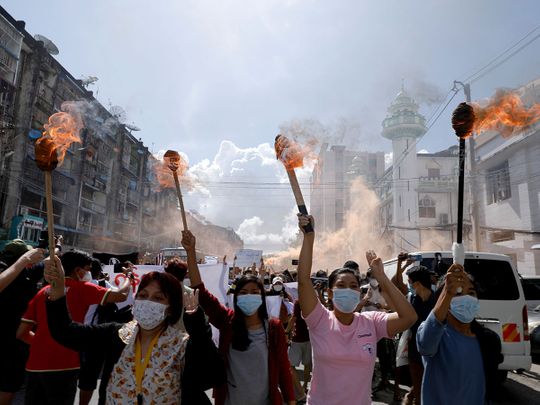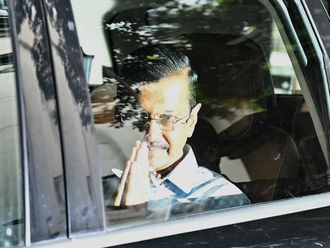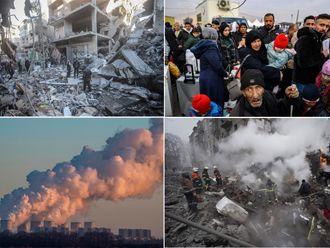
In an unprecedented move, the ten-member Association of Southeast Asian Nations (ASEAN) barred the attendance of Myanmar’s Senior General Min Aung Hlaing at its virtual summit hosted by Brunei last week. For an association known for non-interference and consensual engagement, this was a rare bold step and the ‘most severe sanction’ imposed on a fellow member since its founding in 1967. Myanmar joined the group in 1997 when the military started easing its tight control over the country. Other members of the Association includes Indonesia, Malaysia, Thailand, the Philippines, Singapore, Vietnam, Cambodia and Laos.
Crises in Myanmar began when National League for Democracy (NLD), which the Nobel Laurette Aung San Suu Kyi headed, won a significant majority in the Myanmar general election early in the year. The military took over on Feb. 1, the day new government was to be installed, dissolved the newly elected parliament put her and other NLD leadership under arrest. She is now under trial for various crimes. The military justifies the takeover because of the alleged electoral fraud.
People of Myanmar reacted to the takeover. The military has tried to consolidate its grip on the country in the face of widespread agitation. Since the coup approximately 1,200 people have been killed and thousands injured. Over 8,000 are believed to have put in jails according to Assistance Association for Political Prisoners. The military disputes these figures and argues that armed conflict is being stoked by ‘terrorists’ allied with the National Unity Government (NUG) formed by the group of NLD MP’s and civil society groups opposed to the military rule.
The NUG has declared a ‘people’s defensive war’ against the regime and their groups are reported to stage attacks on the military’s targets frequently, drawing reprisals from the military. Neither of them are in a position to prevail. A situation where symbols of regime are continuously targeted, military’s action will mean that insecurity will continue indefinitely. The crises is also exacerbated by a deepening economic recession, rising prices and collapse of health services amid the Covid-19 pandemic.
When the military took over in February, the UN and the Western powers issued strong statements of condemnation against the military. The ASEAN however, in keeping with its culture and norms, issued a muted statement calling for dialogue and a “return to normality in accordance with the will and interests of the people of Myanmar”.
As the situation aggravated, ASEAN held an emergency summit in Jakarta in April where General Min Aung Hlaing received full protocol of a head of the state. ASEAN agreed on a 5-point formula that included ending the escalating violence, launching talks between all parties, humanitarian assistance and appointing a special envoy to facilitate dialogue to help resolve the crisis. In addition to the Western powers, both China and Russia, have supported the ASEAN plan.
As the violence escalates ASEAN envoy has not been able to visit Myanmar on refusal by the military to let him see Aung San Suu Kyi. ASEAN feels Myanmar is not cooperating in resolution of the standoff.
Consequently, citing his failure to implement the agreed 5 points, General Min Aung Hlaing was excluded from the list of participants for the virtual summit hosted by Brunei. ASEAN’s invitation to send a public servant instead was declined by the General. Both sides have nonetheless, carefully avoided any hint of a break.
While refusing to nominate a representative, Myanmar foreign ministry issued a statement denying that it was boycotting the ASEAN adding that Myanmar will continue to constructively cooperate with the ASEAN including the implementation of five-point consensus agreed among the ASEAN member states at the emergency summit held in Jakarta during April this year. Conference Chair Sultan of Brunei, concluding the summit, stated that Myanmar remains an “integral part” of the regional grouping and that “ASEAN will always be there for Myanmar.”
ASEAN is also the convening body for some other summits annually, that dovetail with the ASEAN and are attended by the leaders of world like the US, China, Japan, Korea, India, Australia. It must have made the ASEAN leadership feel odd to even think of putting the US president and other leaders in the same room with General Min Aung Hlaing. Hence, the decision to exclude the General for now. But, an exclusion of a member state cannot persist indefinitely for it will cause fissures within the body.
The situation in Myanmar is a test case for ASEAN that claims its ‘centrality’ in relations to all political, strategic, social and economic matters in Southeast Asia. That is why the UN and other major powers have let the ASEAN take lead in search for ways to bring normality back to Myanmar. A prolonged crisis in Myanmar casts a doubt over its credibility, which the Association already finds under threat.
___________________________________________________
Sajjad Ashraf served as an adjunct professor at the Lee Kuan Yew School of Public Policy, National University of Singapore from 2009 to 2017. He was a member of Pakistan Foreign Service from 1973 to 2008 and served as ambassador to several countries.



_resources1_16a45059ca3_small.jpg)





